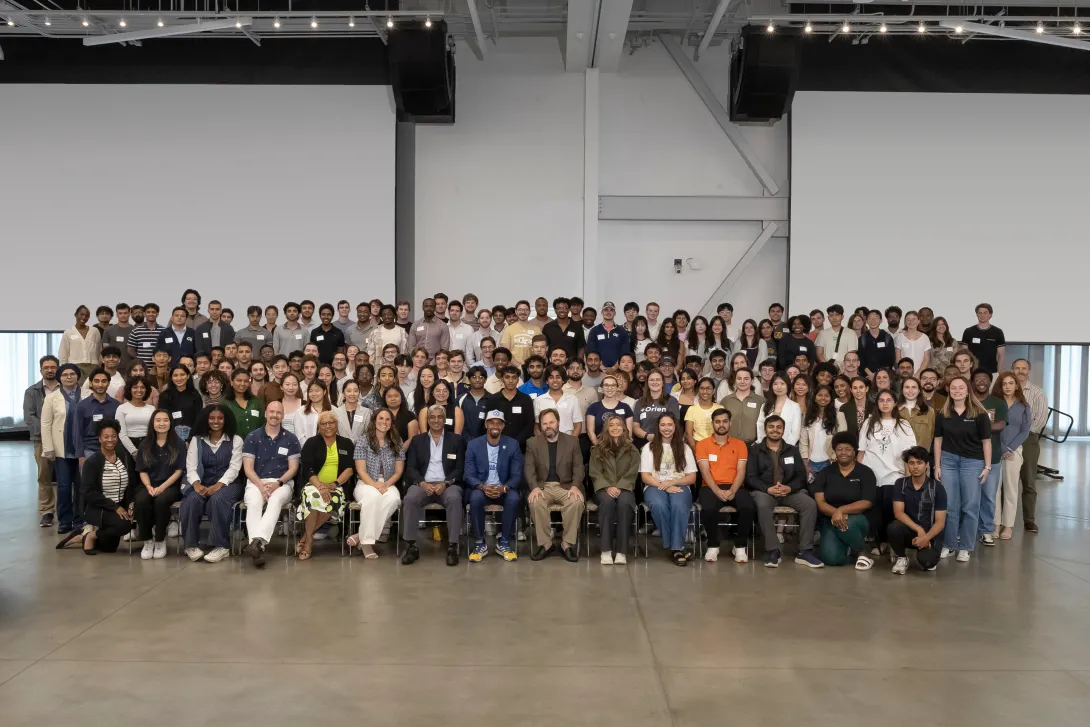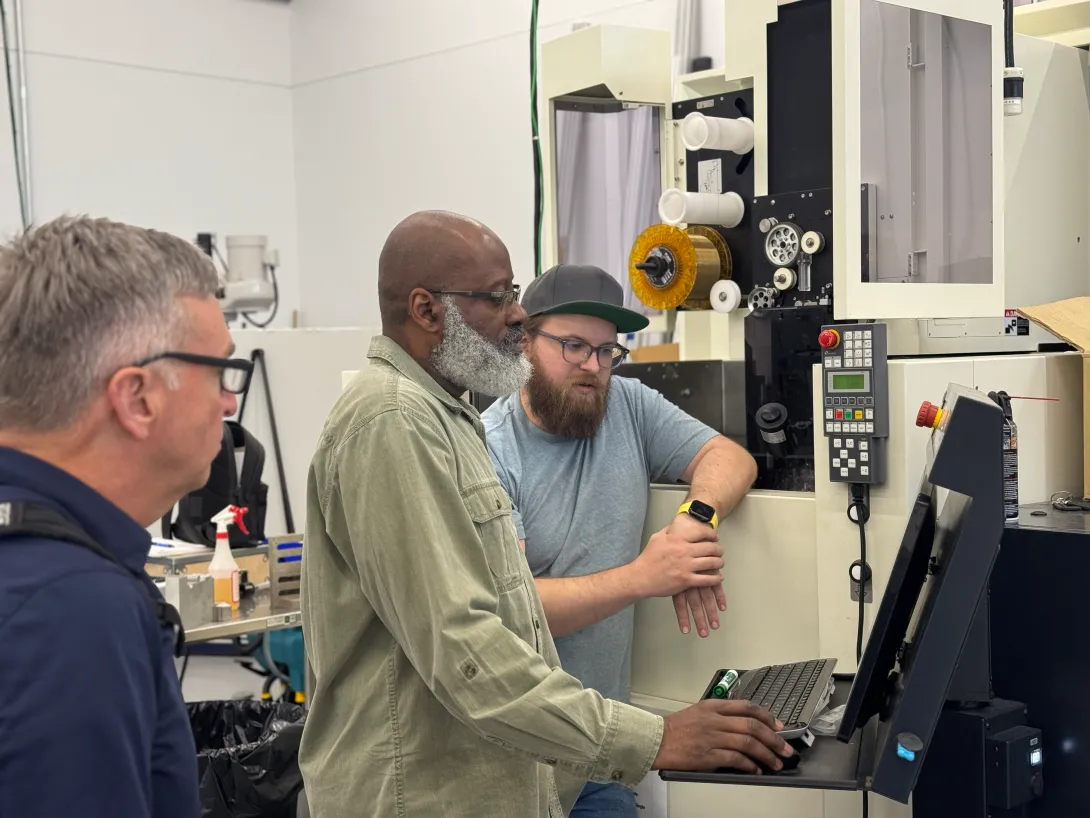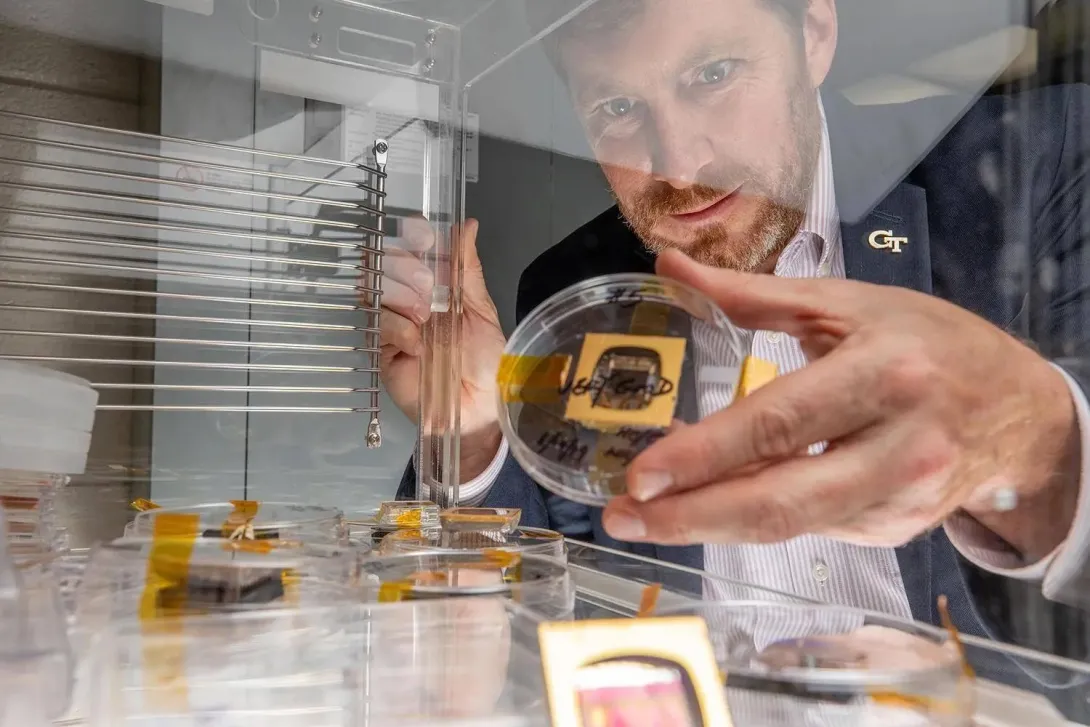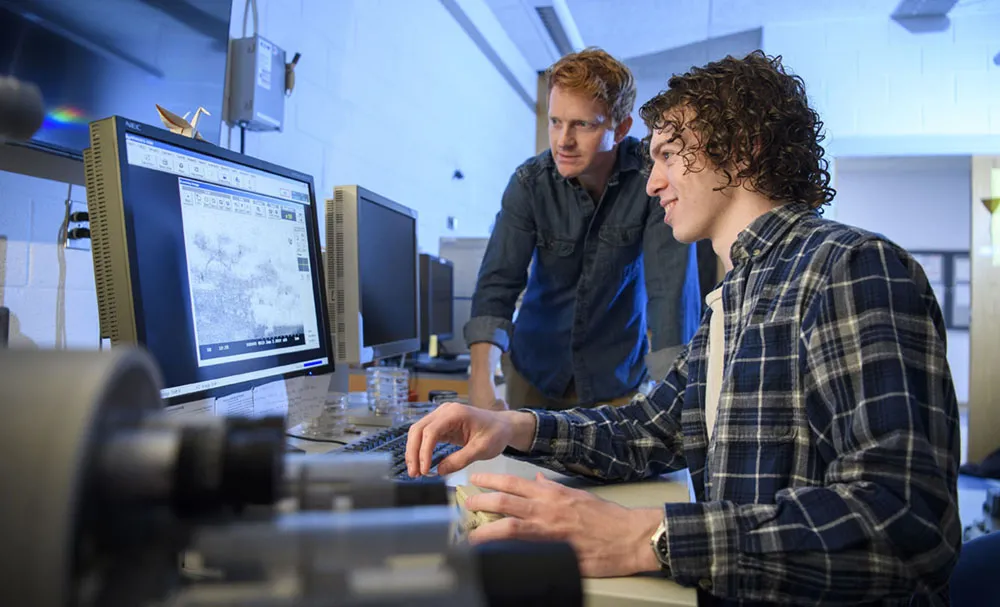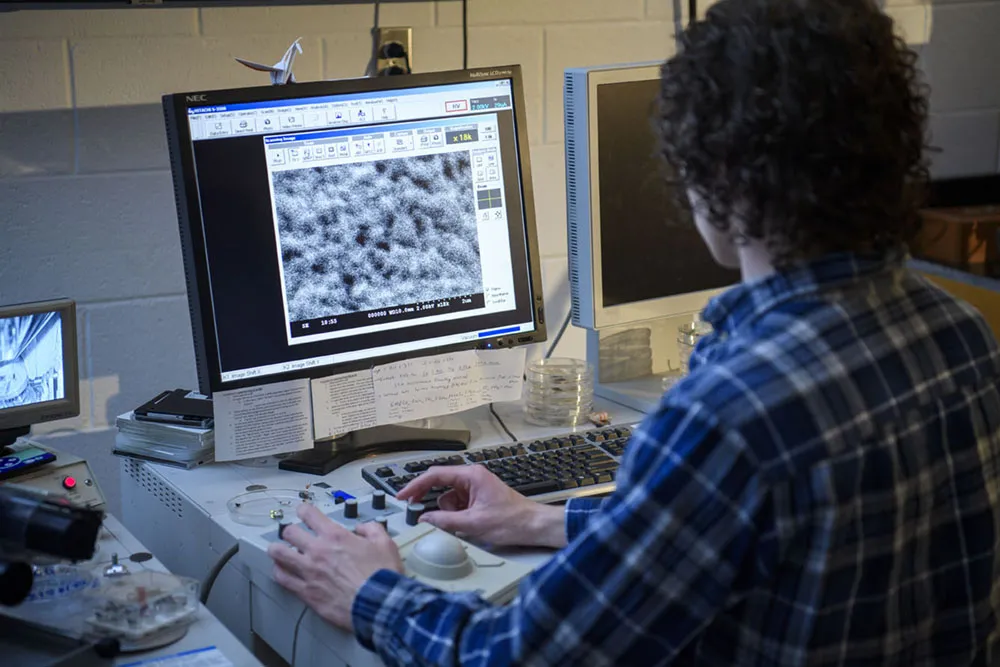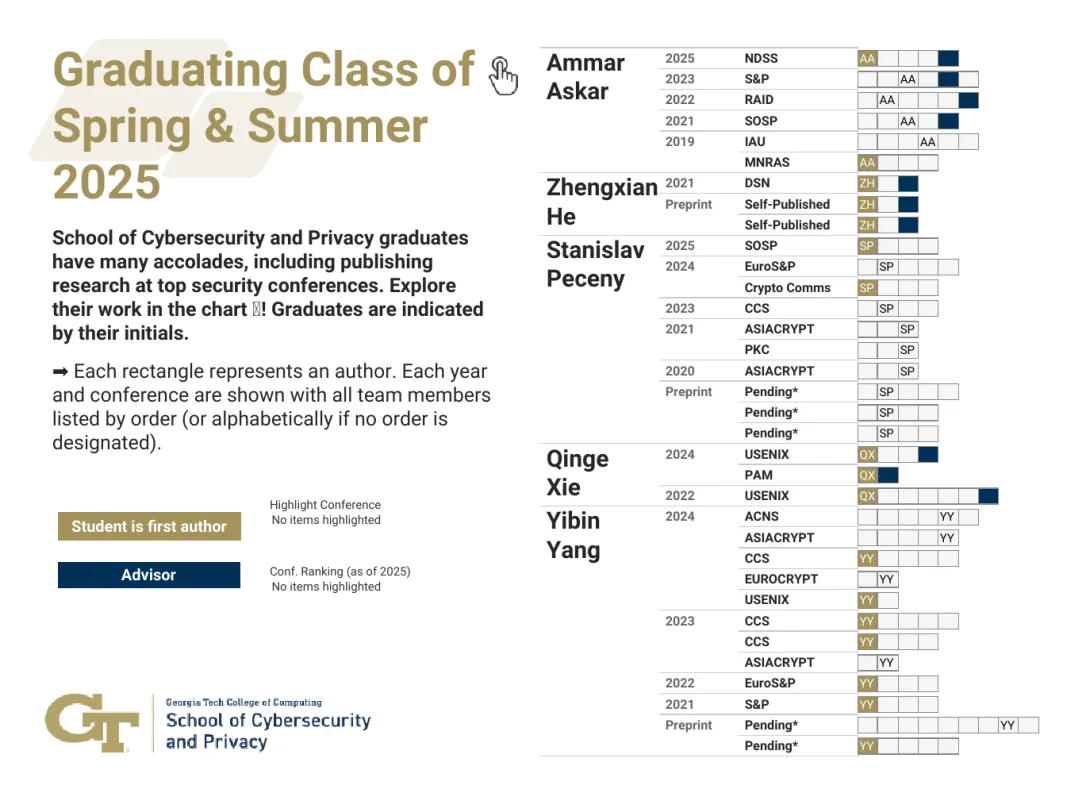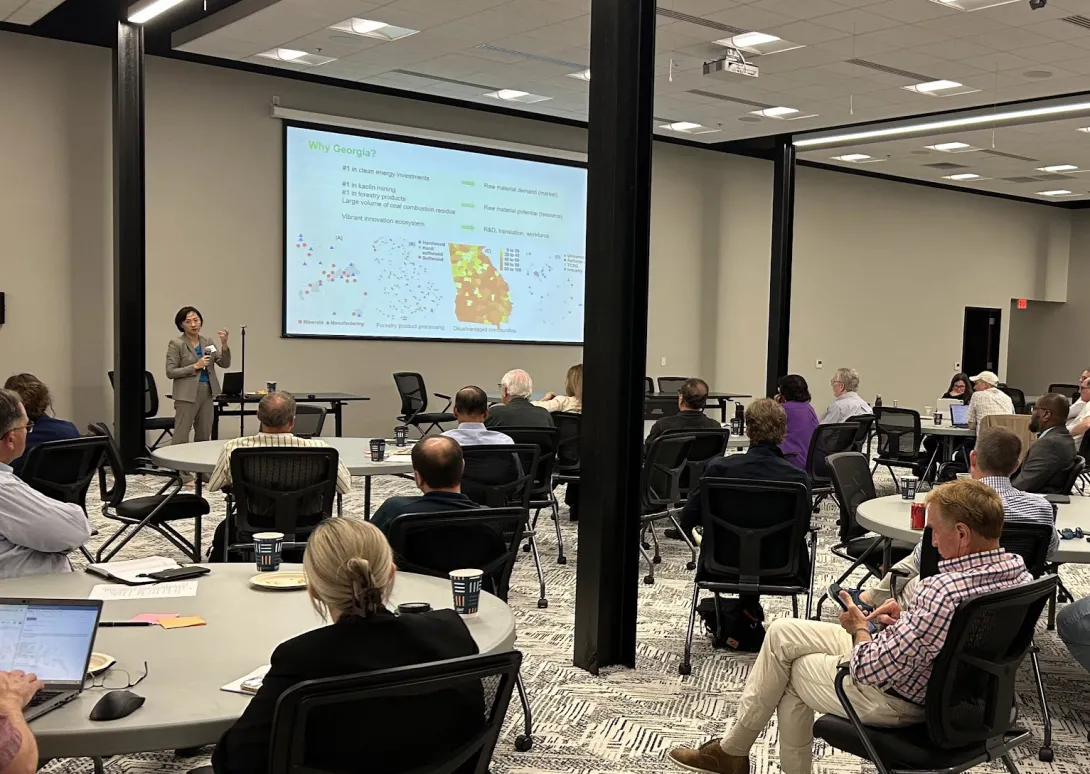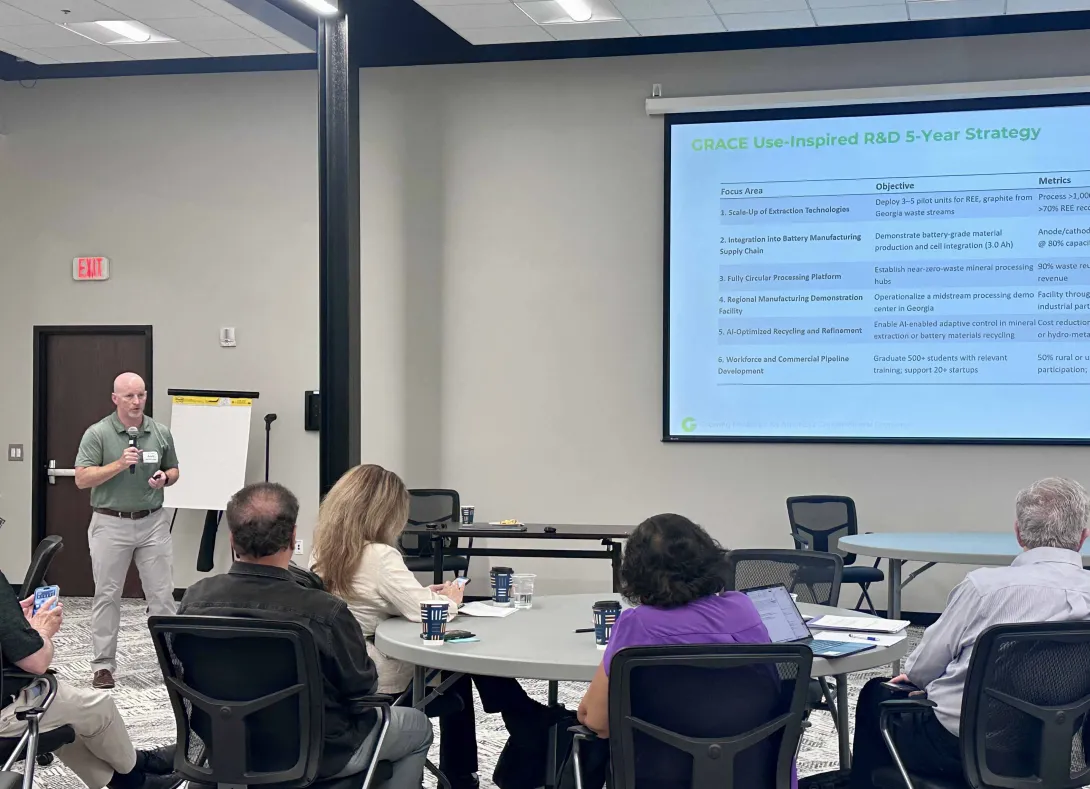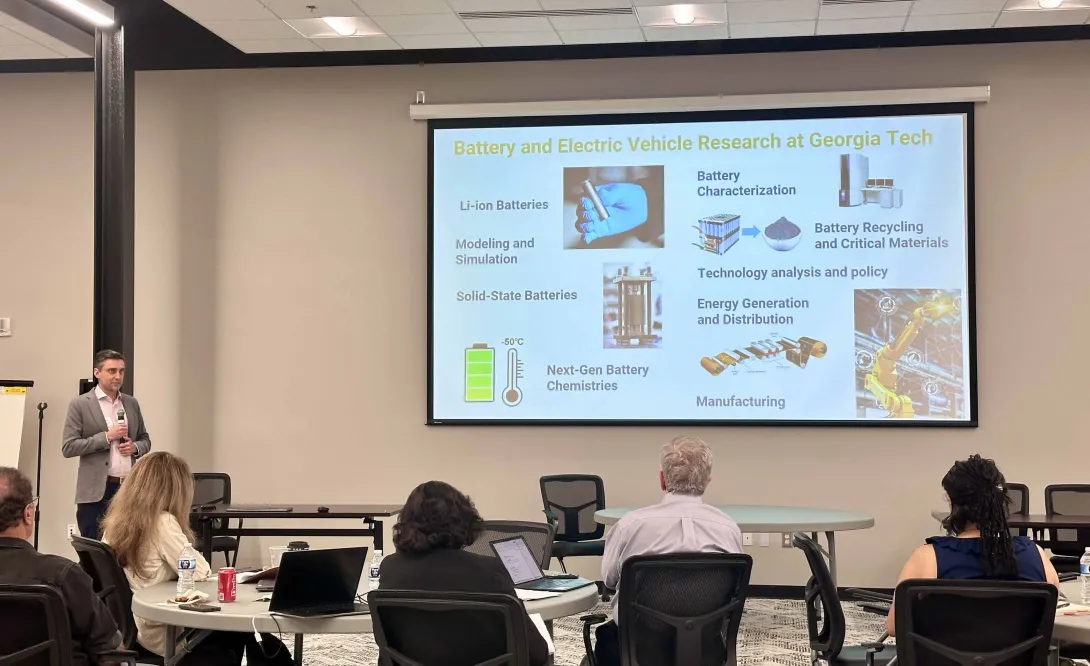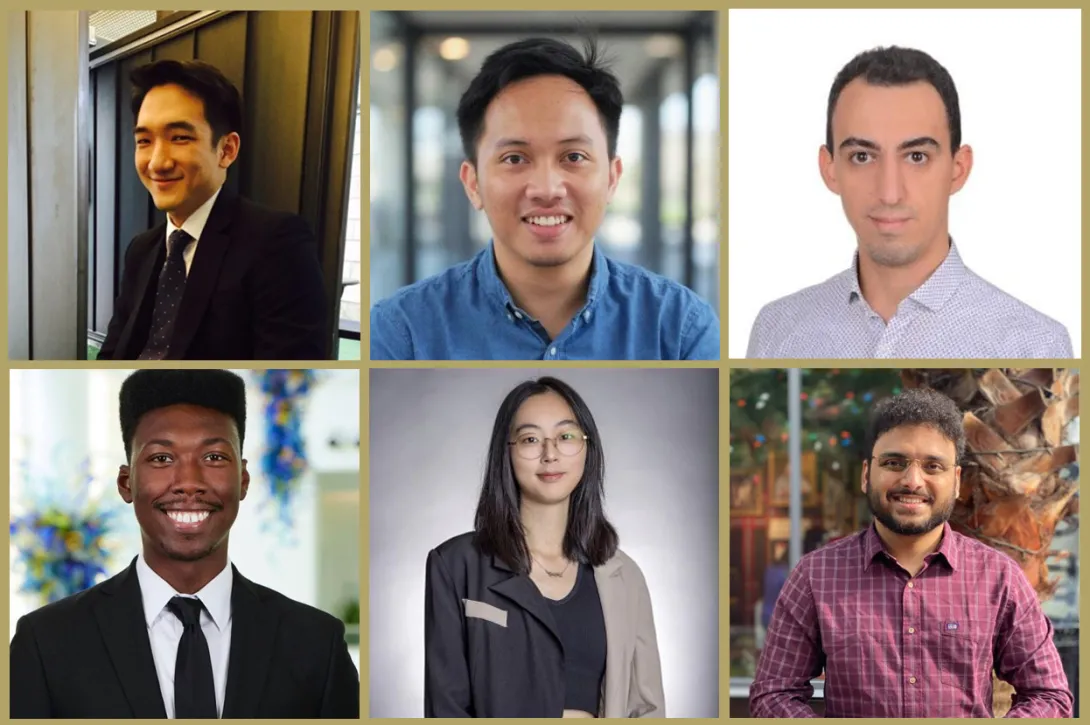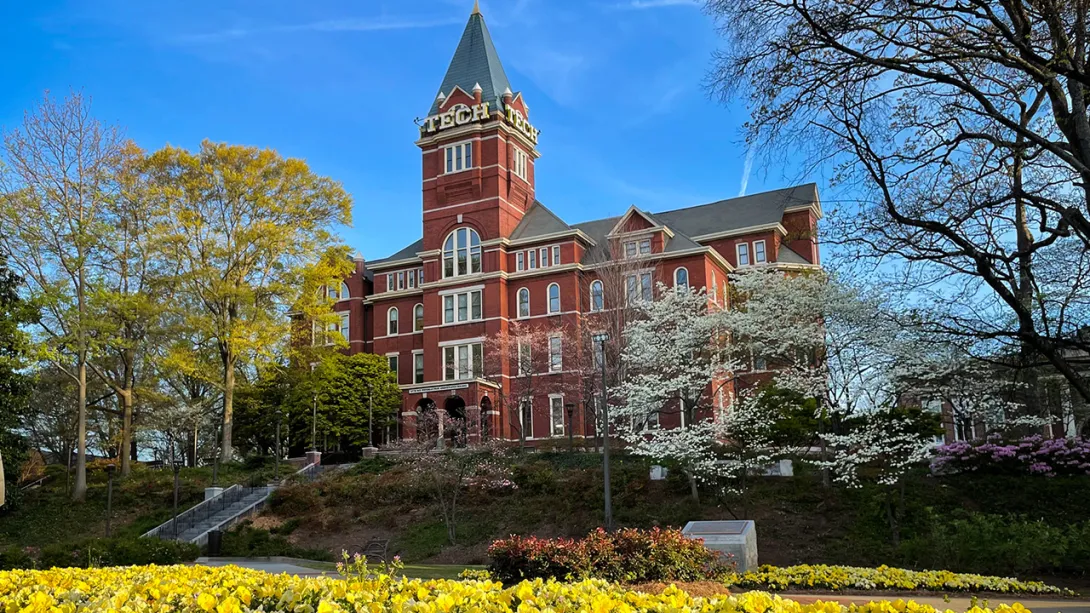May. 30, 2025
CREATE-X, Georgia Tech’s premier entrepreneurship program, kicked off its 12th Startup Launch cohort this month with a record-breaking 137 student teams and 25 faculty and research teams — totaling 318 founders. The summer-long accelerator, known for turning ideas into real-world ventures, is once again positioning Georgia Tech as a national leader in invention and startup creation.
This year’s cohort spans a wide range of industries, including artificial intelligence, defense, healthcare, gaming, sustainability, media management, agriculture tech, fashion tech, education, and more.
“These founders are in the messy middle and that's a beautiful place to be. There’s a lot of freedom in that,” said Margaret Weniger, director of Startup Launch. “We’re all going to be in this together. It's a safe space to try new things. It’s OK if it doesn't work out because what we want founders to learn is an entrepreneurial mindset and entrepreneurial spirit — something you take with you no matter what you do after this.”
Over the next 12 weeks, teams will validate ideas, build products, and acquire customers with the help of dedicated coaches, a robust founder community, and a network of mentors and alumni.
Raghupathy "Siva" Sivakumar, Georgia Tech’s inaugural vice president of Commercialization and the faculty founder of CREATE-X, spoke about the core of CREATE-X and what it would take for founders to succeed.
“Startup Launch is not about Georgia Tech gaining from your success. We are here just for one reason, which is to make you successful,” he said. “You need to hold yourself accountable. You need to be ambitious in terms of how big a problem you solve. You need to be emphatic that the customer matters. The successful teams are 100% behind what's going to make the lives of customers easier and better.”
In 2014, CREATE-X was co-founded by Sivakumar, Steve McLaughlin(who is now the president of The Cooper Union for the Advancement of Science and Art), and other Georgia Tech faculty, including Ray Vito, Craig Forest, and Ravi Bellamkonda (who is now the executive vice president and provost of The Ohio State University). The program received its initial major philanthropic support from Chris Klaus, a Georgia Tech alumnus and tech entrepreneur, whose gift helped launch the initiative, and , played a key role in building out the program's maker courses. Over the years, CREATE-X has continued to grow, thanks largely to the philanthropic support of alumni and foundations who believe in its mission.
In the last decade, the program has produced over 650 startups, $2.4 billion in portfolio valuation, and had eight founders named to Forbes’ 30 Under 30. Wagner shared stories of past teams who pivoted dramatically — from a glucose-monitoring pillow to a sobriety app now valued at over $350 million, and from a camping gear delivery service to a billion-dollar logistics platform.
“We don’t know which ideas will become the next unicorns,” Weniger said. “But we’re betting on you.”
At the kickoff event, McLaughlin and Klaus were honored for their contributions to Georgia Tech’s entrepreneurial ecosystem. McLaughlin encouraged the founders through the story of CREATE-X.
“From the very beginning, we challenged CREATE-X to be a startup as well. To this day, CREATE-X has raised its own money to do this. It's a reminder of what it takes to make this happen,” he said. “This is the most difficult challenge you have ever taken. I think at the time, we were probably skeptical about whether students could do it. Now we know that you can.”
Georgia Tech President Ángel Cabrera reflected on the impact of McLaughlin, Klaus, and others who saw the vision of Georgia Tech being an entrepreneurial campus.
“Ten years ago, this was a crazy, absurd idea,” he said. “Now, 150 teams are working on their own crazy ideas. Even though sometimes there's this idea of the entrepreneur as a loner, what you learn very quickly is entrepreneurship is a team sport.”
Klaus spoke about people collaborating and helping solve problems together.
“I'm especially inspired by Georgia with its complex history,” he said. “It continues to be a place where peace can be envisioned and pursued. I think this recognition strengthens my commitment to building bridges, resolving conflict, and lifting up voices that seek unity. As you build your businesses, you'll be building collaborations and partnerships, and hopefully make the world a better place.”
As the summer progresses, founders will be guided by CREATE-X’s core values: experiential education, entrepreneurial confidence, and real-world impact. Weniger encouraged teams to “show up uncomfortable” and “leverage every single resource” available.
The journey will culminate at Demo Day, where teams will showcase their startups to investors, industry leaders, and the broader community. The event is free, open to the public, and promises a front-row seat to the next wave of Georgia Tech-born innovation.
Demo Day 2025 will take place on Thursday, Aug. 28, at 5 p.m., in the Exhibition Hall. For more information and to RSVP, visit the CREATE-X Demo Day Eventbrite.
News Contact
Breanna Durham
Marketing Strategist
May. 28, 2025
Thomasville, Georgia, is a hub of training and talent for local manufacturers. But Mason Miller could tell there was something missing.
“We didn't have any training for advanced manufacturing in our area,” said Miller, vice president of Academic Affairs at Southern Regional Technical College (SRTC), which offers education and training programs in technical and manufacturing fields. “Companies had to go out and recruit people from Michigan to run their machines. That's when we said, ‘We don’t want that to happen — we need to be doing that right here.’”
That’s where the Georgia Tech Manufacturing Institute (GTMI) stepped in. Working with partner program Georgia Artificial Intelligence in Manufacturing (Georgia AIM), GTMI helped connect SRTC with the resources and expertise needed to develop a robust training program tailored to the needs of local manufacturers.
Miller said at first, he was skeptical. “When GTMI said they wanted to be partners, I thought, ‘OK, this is another situation where we're going to talk for a minute, everybody says things and then goes away — and that’s it,’” said Miller. “That's not how it's been at all.”
Rather, it’s been a true partnership driven by SRTC, with curriculum focused on automation and robotics developed by the Technical College System of Georgia and GTMI. The curriculum is also shaped by local industry input to directly address workforce gaps in the region’s manufacturing sector.
“As a state institution, we're here to serve you,” said Steven Sheffield, senior assistant director of Research Operations at GTMI and a point person of the partnership. “Tell us the problem, and we will work hard to try to solve it with you.”
Filling the Workforce Gap
Miller was committed to giving SRTC students the advanced manufacturing skills needed to stand out in the workforce. Yet the evolving manufacturing landscape and the needs of local manufacturers revealed gaps in SRTC’s curriculum, particularly in AI, automation, and robotics.
With GTMI and Georgia AIM researchers contributing key expertise to the expanded smart manufacturing curriculum, Miller noted the partnership is “opening our eyes to what we can do with AI. We're going to start integrating that into our programs.”
Beyond AI and robotics, SRTC leadership identified a crucial gap in their program: training in precision machining, a skill that local manufacturers like Check-Mate Industries sorely needed.
“If we want to attract new business and industry to Georgia, we need to be able to show them we can provide a skilled workforce,” said Miller.
To address this missing piece, GTMI and Georgia AIM helped procure funding to acquire and refurbish precision-machining equipment from longtime partner Makino. Georgia AIM also supported the renovation and outfitting of two SRTC lab spaces with additional updated equipment.
Last fall, SRTC launched its new Precision Manufacturing & Engineering and Manufacturing Engineering Technology programs, with instructors trained by GTMI faculty in precision manufacturing. The new program at SRTC is one example of the ways GTMI experts are working with communities across the state to expand access to training and new technology.
“Not a lot of technical colleges have this type of machinery,” said Marvin Bannister, SRTC precision machining and manufacturing program chair. Instructors like Bannister received specialized training at GTMI’s Advanced Manufacturing Pilot Facility to ensure they felt confident teaching students how to operate the machinery. “Not only is it something else to add to my skill set, but the most important thing is that I'll be able to train other students who desire to learn on a machine like this.”
Because of SRTC’s expanded offerings, the technical college has strengthened partnerships and developed new internship programs with local manufacturers. “We all want the same thing,” said Miller, “which is to grow industry partnerships and to create a talent pipeline for our state.”
GTMI and Georgia AIM also support STEM programs with Thomasville area schools and internship programs for K-12 teachers with local manufacturers such as Check-Mate. These efforts deepen the connections between students and manufacturers, opening doors to future careers in the sector.
“We’re here to connect the dots and enable these types of partnerships,” says Steven Ferguson, a principal research scientist with GTMI and co-director of Georgia AIM. “When teams and their networks come together to solve a challenge for just one manufacturer, the impact can reach across an entire region.”
News Contact
Audra Davidson
Research Communications Program Manager
Georgia Tech Manufacturing Institute
May. 27, 2025
Space researcher. Materials scientist. Entrepreneur. And Yellow Jacket. The only thing missing on Jud Ready’s resume is “astronaut.” Not for lack of trying, though. Ready had hoped earning his bachelor’s, master’s, and doctoral degrees in materials science and engineering at Georgia Tech would lead him to a spot in NASA’s Astronaut Corps. Instead, it’s led him to the Georgia Tech Research Institute (GTRI), where his passion for space is alive and well.
1. What about space fascinates you?
It all goes back to my dad being interested in space. In first grade, we went to a how-to-use-the-library class, and I came across a book about the Mercury and Apollo astronauts. I checked it out and renewed it over and over again. I eventually finished it in second grade. So, I’ve had a lifelong commitment since then to space.
2. What drew you to engineering?
I grew up in Chapel Hill. In that same first grade class, we went to the University of North Carolina chemistry department. My mom is really into roses, and they froze a rose in liquid nitrogen then smashed it on the table. It broke into a million bits, and I was like, “What?!” The ability of science to solve the unknown grabbed me. And I had a series of very good science teachers — Mr. Parker in fifth grade, in particular. Then I took a soldering class in high school. We built a multimeter that I still have and still use, and various other things. And I suddenly discovered and started exploring engineering. Plus, I just like making things.
3. How did your career change from hoping to be an astronaut to being an accomplished materials engineer?
When I started looking at colleges, that was my primary interest: What school would help me become an astronaut the quickest. I applied to Georgia Tech as an aerospace engineer, but was admitted as an undecided engineering candidate instead. It was the best thing that could have happened. Later, I got hired as an undergrad by a professor who was doing space-grown gallium arsenide on the Space Shuttle. Ultimately, they offered me a graduate position. I accepted, because I knew you needed an advanced degree to be an astronaut — and for a civilian, a Ph.D. in a relevant career such as materials science.
I applied so many times to be an astronaut — every time they opened a call from 1999 until just a few years ago. Never got in. But I was successful at writing proposals and teaching. So I started doing space vicariously through my students, writing research proposals on energy capture, such as solar cells; energy storage, such as super capacitors; and energy delivery like electron emission. They’re all enabled by engineered materials.
4. What makes Georgia Tech and GTRI a key contributor to the future of humans and science in space?
Georgia Tech offers us so many unfair advantages over our competition. The equipment we’ve got. The students. You’ve got the curiosity-driven basic research coupled with the GTRI applied research model. We’ve had VentureLab and CREATE-X. Now we’ve got Quadrant-i to foster spinout companies from research.
5. One of your solar cell technologies is headed to the Smithsonian National Air & Space Museum. What is it?
Early in my career, we developed a way to texture thin film photovoltaics to allow for light trapping. Inverted pyramids are etched into silicon wafer-type solar cells so a photon of light has a chance to hit different surfaces and get absorbed. But thin film solar cells typically don’t etch well. I thought we could use carbon nanotubes to form a scaffolding, a structure like rebar. It’s mechanically reinforcing, but also electrically conductive. We coat the thin film solar cell material over the carbon nanotube arrays. You’ve got these towers, and you get this photon pinballing effect. Most solar cells perform best when perpendicular to the sun, but with mine, off angles are preferred. That’s great for orbital uses, because the faces and solar panels of spacecraft are frequently off-angle to the sun. And then you don’t have the complexity of mechanical systems adjusting the solar arrays. So, we got funding to demonstrate these solar cells on the International Space Station three times, and those are some of the cells we provided to the Smithsonian.
News Contact
Joshua Stewart (jstewart@gatech.edu)
Assistant Director of Communications,
College of Engineering, Georgia Tech
May. 27, 2025
For many researchers, access to advanced instrumentation and toolsets can be the difference between an idea and getting published. But not all academic institutions can prioritize research instrumentation on the same scale.
Jacob Sylvie, an undergraduate researcher at Berry College, experienced this firsthand. His research focused on developing benchtop electrochemical methods to grow crystalline semiconductor materials — work that required highly specialized techniques and tools. Even though Sylvie performed most of his research at Berry, he still had one problem: He needed access to resources that weren’t available on campus.
“Since Berry College is a small, liberal arts, primarily undergraduate institution, we only have access to a limited range of in-house instrumentation,” said Zachary Lindsey, assistant professor at Berry College and Sylvie’s advisor. “The combination of the available instrumentation and focused support offered by expert personnel at Georgia Tech presented a rare, world-class opportunity for my students.”
Sylvie and Lindsey reached out to the Institute for Matter and Systems’ Materials Characterization Facility regarding characterization services. They were advised to apply for the Southeastern Nanotechnology Infrastructure Corridor (SENIC) Catalyst Program to support Sylvie’s research needs.
The program supports researchers in microtechnology, nanotechnology, and the broader scientific community by providing access to SENIC facilities to aid in research, obtain preliminary data, conduct proof-of-concept studies, or for educational purposes.
“One of the goals of SENIC is to democratize access to world-class facilities, like the ones here at IMS,” said David Gottfried, associate director of external user programs and SENIC site director at Georgia Tech. “The Catalyst Seed Grants are one way we can make sure that anyone can benefit from our research infrastructure.”
Through the program, Sylvie and Lindsey received use-of-tool access, staff time, and materials and supplies for six months. During this time, Sylvie published his first peer-reviewed article in Physica B: Condensed Matter. The publication played a pivotal role in his successful application for the Goldwater Scholarship in March.
“I cannot emphasize enough the magnitude of the support and efficiency of the SENIC Catalyst Seed Grant,” said Lindsey. “The impact that this program has had on my students and me is irreplaceable, and I highly recommend that other faculty and students take advantage of this opportunity to push your research to new heights.”
Programs like SENIC don’t just support research — they bridge the gap between potential and achievement, empowering students from all backgrounds to reach new heights in science and innovation.
This work was performed in part at the Georgia Tech Institute for Matter and Systems, a member of the National Nanotechnology Coordinated Infrastructure (NNCI), which is supported by the National Science Foundation (Grant ECCS-2025462).
News Contact
Amelia Neumeister | Research Communications Program Manager
The Institute for Matter and Systems
May. 19, 2025
You’re managing the Texas Panhandle’s power grid. Heavy winds are blowing, and a worn-out utility pole ignites a fire by crashing onto a transmission line. Luckily, the fire department arrives quickly, putting out the fire before it spreads to nearby cities. But the same thing may happen again with gusty conditions predicted for the next 24 hours. Should you shut off miles of power lines to reduce that risk, causing outages for thousands of residents? Should you add batteries to the grid or move some power lines underground to lessen the impact of future fires? That sounds useful, but paying for these upgrades would require raising electricity rates.
Players of the Current Crisis video game are pondering these questions, similar to professional grid managers during the Texas Smokehouse Creek fire in 2024. But the players did not purchase Current Crisis at a run-of-the-mill gaming store. They might have played it at Georgia Tech’s Dataseum, which featured the game in a recent exhibition. Or they might have helped develop it in weekly meetings with Daniel Molzahn, associate professor in the School of Electrical and Computer Engineering and EPIcenter initiative lead.
“Current Crisis started as a computer simulation I programmed in Summer 2020 for a senior-level course I taught that fall,” says Molzahn. “My students had to dispatch crews to maintain or repair a simplified model of the Georgia power grid. In the middle of the Covid-19 pandemic, each dispatch had a risk of infection and quarantine, which meant losing the crew for the rest of that round. The students had a fixed budget to balance two competing goals: operating a power system with minimal outages and keeping the repair crews healthy.”
The class project was popular, and its scope began to grow. Molzahn proposed turning his simulation into a video game in a July 2021 grant application to the National Science Foundation. He received the five-year award that fall and launched his “Vertically Integrated Project” on power grid gaming the following spring. It soon attracted about 35 students per semester, from sophomores to those pursuing graduate degrees in various disciplines. Most students stay for three to four semesters.
Tristan Ziegler joined the VIP as a computational media sophomore in Spring 2022 — and still works on it three years later as a professional programmer. “I found the project by searching for ‘game’ on the VIP website,” says Ziegler, who graduated in 2024. “It offered much more freedom than traditional classes but still allowed me to earn credits and grades, unlike a student organization where you volunteer your time.”
The students quickly discovered the benefits of working toward a shared goal in smaller groups, focused on coding, grid modeling, graphic design, or artistic creativity. Some volunteered to lead initiatives, such as organizing the Dataseum exhibition or the 2025 Seth Bonder summer camps, where they will teach high schoolers the basics of game programming.
Another long-term member of the VIP team is Ryan Piansky, a doctoral student, who studies the resilience of power grids to wildfires. He combines well-known engineering tools — algorithms for finding a mathematically optimal problem solution — with historical wildfire data to evaluate grid management decisions.
“I have examined if policies based on established engineering principles help the people who need the most help, reduce the risk of outages broadly across the whole grid, and optimally allocate limited resources,” explains Piansky, who works in Molzahn's research lab. “To do that, I combine power grid models with realistic wildfire simulations to assess if those policies would likely generate desirable outcomes in a range of plausible scenarios.”
The VIP work on grid modeling has informed Piansky’s research, but the climate models he uses to mimic the spread of wildfires are too complex for a fast-moving video game. That’s why he has helped the students develop simplified versions of these models. Humidity and vegetation, for example, influence both real fires and those popping up in Current Crisis.
Piansky’s research is part of Molzahn’s long-term goal: developing computer tools that help professional grid managers improve the grid’s resilience to natural disasters — from pandemics and wildfires to hurricanes, heat waves and floods.
“We plan to record the choices made by Current Crisis players in crowdsourced datasets that will support our research,” says Molzahn. “By using these datasets to train machine-learning algorithms, we can harness the power of AI to develop better disaster response policies.” (The European Space Agency uses a similar gamification strategy to map moon craters.)
The project’s benefits go well beyond these research contributions. Its educational value includes experience working in multidisciplinary teams of students at different levels and leadership development. Molzahn also hopes the game will help build public acceptance of disruptive actions during real disasters.
“Recognizing the tradeoffs inherent in grid management is important, whether it’s understanding why power shutoffs reduce fire risks or why service restorations are time-consuming,” says Molzahn. “This may also generate broader public support for electricity rate increases and tax allocations to pay for infrastructure hardening.”
Written by: Silke Schmidt
News Contact
Story Written by: Silke Schmidt
Priya Devarajan || Research Communications Program Manager
May. 14, 2025
The School of Cybersecurity and Privacy at Georgia Tech is proud to recognize the accomplishments of five doctoral students who finished their doctoral programs in Spring 2025. These scholars have advanced critical research in software security, cryptography, and privacy, collectively publishing 34 papers, most of which appear in top-tier venues.
Ammar Askar developed new tools for software security in multi-language systems, including a concolic execution engine powered by large language models. He highlighted DEFCON 2021, which he attended with the Systems Software and Security Lab (SSLab), as a favorite memory.
Zhengxian He persevered through the pandemic to lead a major project with an industry partner, achieving strong research outcomes. He will be joining Amazon and fondly remembers watching sunsets from the CODA building.
Stanislav Peceny focused on secure multiparty computation (MPC), designing high-performance cryptographic protocols that improve efficiency by up to 1000x. He’s known for his creativity in both research and life, naming avocado trees after famous mathematicians and enjoying research discussions on the CODA rooftop.
Qinge Xie impressed faculty with her adaptability across multiple domains. Her advisor praised her independence and technical range, noting her ability to pivot seamlessly between complex research challenges.
Yibin Yang contributed to the advancement of zero-knowledge proofs and MPC, building toolchains that are faster and more usable than existing systems. His work earned a Distinguished Paper Award at ACM CCS 2023, and he also served as an RSAC Security Scholar. Yang enjoyed teaching and engaging with younger students, especially through events like Math Kangaroo.
Faculty mentors included Regents’ Entrepreneur Mustaque Ahamad, Professors Taesoo Kim and Vladimir Kolesnikov, and Assistant Professor Frank Li, who played vital roles in guiding the graduates’ research journeys.
Learn more about the graduates and their mentors on the 2025 Ph.D. graduate microsite.
News Contact
JP Popham, Communications Officer II
College of Computing | School of Cybersecurity and Privacy
May. 13, 2025
Gaurav Doshi, assistant professor in applied economics and a faculty affiliate of the Georgia Tech Energy Policy and Innovation Center researches, among other topics, ways to make the benefits of large electrification projects more transparent.
It’s a chicken and egg situation: Should renewable energy projects launch first hoping that transmission lines to pipe generated power to distant places will follow on their heels? Or should the transmission lines be stood up first as a way to attract investments in renewable energy projects? Which comes before the other? It’s a question that has intrigued Gaurav Doshi, assistant professor at the School of Economics at Georgia Tech, for a while now. His award-winning paper about this research explores the downstream effects of building power lines.
After a bachelor’s and master’s degree in applied economics from the Indian Institute of Technology at Kanpur, Doshi earned his doctorate in the same field from the University of Wisconsin at Madison in 2023. He explored questions about environmental economics as part of his doctoral work.
“Once I started researching energy markets in the U.S., I kept getting deeper and coming up with new questions,” Doshi says. Among the many his work explores: What are the effects of infrastructure policies and how can they help decarbonization efforts? What are some of the unintended consequences policy makers need to think about?
One of his current research projects has roots in his doctoral work. It explores how to quantify the benefits of difficult-to-quantify environmental infrastructure projects. Case in point: Decarbonization will likely lead to more electrification from renewable energy resources and will need power lines to transport this energy to places of demand. The costs for such infrastructure are pretty transparent as part of government project funding. But the benefits are less so, Doshi points out. To develop effective policy, both the costs and benefits need clear visibility. “Otherwise the question arises ‘why should we spend billions of dollars of taxpayer money if we don’t know the benefits?’”
News Contact
Written by: Poornima Apte
Contact: Priya Devarajan || SEI Communications Program Manager
May. 12, 2025
On April 29, nearly 70 attendees representing 36 organizations from industry, government, academia, and nonprofits gathered at the Middle Georgia Regional Commission for the third Georgia Partnerships for Essential Minerals (GEMs) Workshop, held jointly with the Growing Resilience for America’s Critical Mineral Economy (GRACE) Engine initiative. The workshop marked a pivotal step in the region’s critical mineral strategy, bringing together leaders across sectors to align priorities and accelerate ecosystem development.
Hosted by the Center for Critical Mineral Solutions and Strategic Energy Institute at Georgia Tech in partnership with the Middle Georgia Regional Commission, GEMs-3 highlighted the economic development potential of critical minerals through production and recycling. Critical Minerals such as rare earth elements, gallium, and graphite are materials essential for technologies ranging from electric vehicles, permanent magnets to national defense systems. Building on the industry-led conception of GEMs-1 and road mapping efforts at GEMs-2, this workshop focused on translating strategy into action, with particular emphasis on use-inspired innovation, commercialization, workforce development, community engagement, and strategic investment.
Keynote speaker Costas Simoglou, director of the Center of Innovation for Energy Technology at the Georgia Department of Economic Development, emphasized the state’s leadership in advanced energy manufacturing and innovation. Sessions highlighted ecosystem capabilities and insights from experts at Southern Company, Chemours, Ginn Technology Group, Savannah River National Laboratory, Georgia Research Alliance, Georgia Cleantech Innovation Hub, Georgia Artificial Intelligence in Manufacturing, Technical College System of Georgia, University of Georgia, Partnership for Innovation, the Supply Chain and Logistics Institute, and the Advanced Battery Center.
Yuanzhi Tang, professor at Georgia Tech and director of the Center for Critical Mineral Solutions, shared an update on the GRACE Engine initiative, which aims to develop a co-located innovation ecosystem that integrates extraction, processing and advanced manufacturing across Georgia. “The GRACE vision is to move from potential to practice,” said Tang, “by building a regional supply chain that is resilient, sustainable, built for speed and benefits all stakeholders.”
Afternoon breakout discussions brought participants together into focused groups to explore commercialization models, community advisory board structures, and pilot program priorities. Participants emphasized the importance of fast-start strategies, shared economic development, and leveraging existing regional strengths and infrastructure.
As Georgia continues to lead in kaolin mining and advanced manufacturing, the GEMs-GRACE platform stands as a model for how states can turn mineral resources and waste streams into new engines of economic opportunity.
For more information, visit gems.research.gatech.edu.
News Contact
Written by: Yuanzhi Tang
News contact: Priya Devarajan | SEI Communications Program Manager
May. 07, 2025
The Energy Policy and Innovation Center (EPIcenter) at Georgia Tech has announced the selection of six students for its inaugural Summer Research Program. The doctoral candidates, pursuing degrees in electrical and computer engineering, economics, computer science, and public policy, will be on campus working full-time on their dissertation research throughout the summer semester and present their findings in a final showcase.
EPIcenter will provide a full stipend and tuition for the 2025 summer semester to support the students.
“I look forward to hosting a fantastic cohort of early-career energy scholars this summer,” said Laura Taylor, EPIcenter’s director. “The summer research program will not only help the students advance their research while engaging in interdisciplinary dialogue but also offers professional development opportunities to position them for a strong start to their careers.”
The students will work with EPIcenter staff and be provided with on-campus workshops on written and oral communications. Biweekly meetings over the summer will offer the students an opportunity to share their work, progress, and ideas with each other and the EPIcenter faculty affiliates. In addition, the students will have the opportunity to engage with programs and distinguished guests of the center.
For students interested in presenting their research at a conference, EPIcenter also will provide travel grants of up to $600 pursuant to having their paper/presentation posted on the EPIcenter website.
"I applied to the Summer Research Program because its structure and community aligned perfectly with my summer plan on dissertation work in energy policy,” said Yifan Liu. “I aim to finalize key dissertation chapters and engage closely with peers and mentors to prepare me for the job market."
The program offers students an opportunity to promote their work through the EPIcenter communication channels including the website, news feeds, blogs, and the SEI newsletter.
“I am very excited to spend my summer at EPIcenter exploring how battery storage entry affects competition in the electricity market,” said Maghfira “Afi” Ramadhani, one of the student affiliates selected for the summer research program. “Specifically, I look at how the rollout of battery storage in the Texas electricity market impacts renewable curtailment, fossil-fuel generator markup, and generator entry and exit.”
With a variety of backgrounds and perspectives on energy, each of the students in the summer program brings something unique to EPIcenter.
La’Darius Thomas: “My project explores the potential of peer-to-peer energy trading systems in promoting decentralized, sustainable energy solutions. I aim to contribute to the development of energy models that empower individuals and communities to directly participate in electricity markets.”
Niraj Palsule: “I intend to gain interdisciplinary insights interfacing energy transition technology and policy developments by participating in the EPIcenter Summer Research Program.”
John Kim: “I believe the EPIcenter Summer Research Program will deepen my investigation of how environmental hazards disproportionately affect vulnerable communities through research on power outage impacts and lead contamination. This summer, I hope to refine my analysis and complete research on the socioeconomic dimensions of power reliability and environmental resilience.”
Mehmet “Akif” Aglar: "I applied to the EPIcenter Summer Research Program because it offers the chance to work alongside and learn from a community of highly qualified researchers across various fields. I believe the opportunity to present my work, receive feedback, and benefit from the structure the program provides will be invaluable for advancing my research."
About EPICenter
The mission of the Energy Policy and Innovation Center is to conduct rigorous studies and deliver high impact insights that address critical regional, national, and global energy issues from a Southeastern U.S. perspective. EPICenter is pioneering a holistic approach that calls upon multidisciplinary expertise to engage the public on the issues that emerge as the energy transformation unfolds. The center operates within Georgia Tech’s Strategic Energy Institute.
News Contact
Priya Devarajan || SEI Communications Program Manager
May. 07, 2025
Daniel Molzahn will readily admit he’s a Cheesehead.
Born and brought up in Wisconsin, the associate professor at the School of Electrical and Computer Engineering attended the University of Wisconsin, Madison, for undergraduate and graduate studies. It was also at Madison that he decided to go into the family business: power engineering.
Molzahn’s grandfather was a Navy electrician in World War II and later completed a bachelor’s in electrical engineering. He eventually was plant director at a big coal plant in Green Bay. Molzahn’s dad was also a power engineer and worked at a utility company, focusing on nuclear power.
It was not uncommon for family vacations to include a visit to a coal mine or a nuclear power plant. Being steeped in everything power engineering eventually seeped into Molzahn’s bones. “I remember seeing all the infrastructure that goes into producing energy and it was endlessly fascinating for me,” he says.
That endless fascination has worked its way into Molzahn’s research today—at the intersection of computation and power systems.
News Contact
Written by: Poornima Apte
News Contact: Priya Devarajan || SEI Communications Program Manager
Pagination
- Previous page
- 3 Page 3
- Next page
